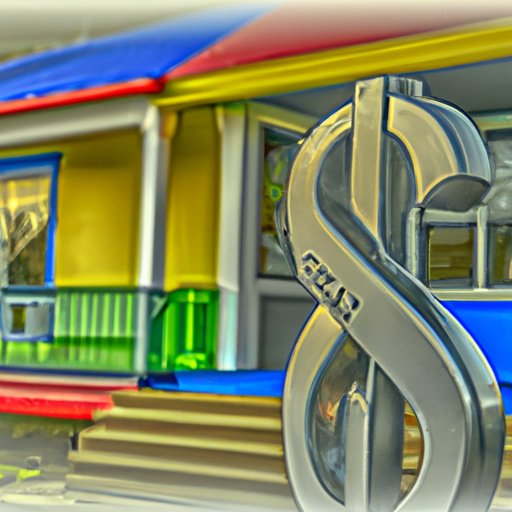Introduction
Buying a second home is an exciting prospect, but it’s important to understand the financing options available before making any decisions. Financing a second home requires careful consideration of the pros and cons associated with each potential solution. In this article, we’ll explore the most common solutions for financing a second home and provide insight into the considerations you should take into account when making your decision.

Definition of Second Home Financing
Second home financing refers to the process of obtaining a loan to purchase a second property. This could be a vacation home, an investment property, or another residence to accommodate a growing family. Second home financing typically involves more paperwork than first-time homebuyers are accustomed to, and lenders may require a higher credit score and down payment amount.
Overview of Common Solutions for Financing a Second Home
When it comes to financing a second home, there are a number of potential solutions available. These include:
- Utilizing home equity loans
- Tapping into retirement funds
- Considering a reverse mortgage
- Investing in real estate investment trusts (REITs)
- Refinancing your primary residence
- Taking out a personal loan
Each of these solutions has its own advantages and disadvantages, so it’s important to carefully weigh the pros and cons of each before making a decision. Let’s take a closer look at each option.
Utilize Home Equity Loans
A home equity loan is a type of loan that allows you to borrow against the equity you have built up in your home. The amount you can borrow is based on the difference between the value of your home and the amount you still owe on the mortgage. Home equity loans can be used to finance a variety of expenses, including the purchase of a second home.
Advantages of Home Equity Loans
One of the main advantages of home equity loans is that they tend to offer lower interest rates than other types of loans. This makes them a great option for those who need to borrow a large sum of money for a second home purchase. Additionally, home equity loans can be used for a wide range of projects, from making home improvements to consolidating debt.
Disadvantages of Home Equity Loans
The main disadvantage of home equity loans is that they tend to be more difficult to qualify for than other types of loans. Additionally, if you are unable to make your payments, you risk losing your home as collateral. It is also important to note that home equity loans typically come with closing costs and other fees, which can add up quickly.
How to Get a Home Equity Loan
If you decide that a home equity loan is the right option for you, the first step is to contact your lender to determine if you qualify. You will likely need to provide documentation such as proof of income, bank statements, and tax returns. Once you’ve been approved, you’ll be able to start the process of applying for the loan.
Tap into Retirement Funds
Another option for financing a second home is to tap into your retirement funds. While this isn’t recommended for everyone, it can be a viable option for those who don’t want to take out a loan or who don’t qualify for one.
Advantages of Using Retirement Funds
The main advantage of using retirement funds to finance a second home is that it can be done without having to take out a loan. Additionally, because the money is coming from your retirement account, there are no interest charges or closing costs associated with the transaction.
Disadvantages of Using Retirement Funds
The downside of using retirement funds to finance a second home is that it can have long-term financial implications. Withdrawing money from your retirement account can reduce the amount of money you have saved for retirement and can also result in taxes and penalties. Additionally, taking money out of your retirement account can put you at risk of running out of money later in life.
Rules and Regulations Surrounding Retirement Funds
It’s important to understand the rules and regulations surrounding retirement funds before making any decisions. Depending on the type of retirement account you have, there may be restrictions on how much money you can withdraw and when you can do so. Additionally, some accounts may require you to pay back any money you withdraw within a certain period of time. Be sure to consult a financial advisor if you have any questions about the rules and regulations surrounding your particular retirement account.
Consider a Reverse Mortgage
A reverse mortgage is a type of loan that allows homeowners aged 62 or older to access the equity in their homes without having to make monthly payments. Instead, the loan is paid off when the homeowner dies, sells the home, or moves out.
Advantages of a Reverse Mortgage
The main advantage of a reverse mortgage is that it can provide cash to purchase a second home without having to make monthly payments. Additionally, the funds can be used for a variety of other purposes, such as home improvements or paying off debt. Furthermore, a reverse mortgage does not affect Social Security or Medicare benefits.
Disadvantages of a Reverse Mortgage
The main disadvantage of a reverse mortgage is that it can be expensive. In addition to the cost of the loan itself, there are often additional fees associated with setting up the loan. Additionally, a reverse mortgage can impact eligibility for certain government programs. Finally, if the homeowner fails to meet the requirements of the loan, they can risk losing their home.
How to Get a Reverse Mortgage
To get a reverse mortgage, you must first meet the eligibility criteria, which includes being 62 years of age or older and owning a home with sufficient equity. You will then need to find a lender that offers reverse mortgages and submit an application. Once you’ve been approved, you’ll be able to receive the funds to purchase your second home.
Invest in Real Estate Investment Trusts (REITs)
Real estate investment trusts (REITs) are a type of investment vehicle that allows investors to invest in a portfolio of real estate properties without actually buying the properties themselves. REITs are traded on the stock exchange and can be a great option for those looking to invest in a second home without taking out a loan.
Advantages of Investing in REITs
One of the main advantages of investing in REITs is that it can provide access to a diversified portfolio of real estate investments. This can help to reduce risk and increase potential returns. Additionally, REITs can be bought and sold quickly and easily, allowing investors to capitalize on market fluctuations.
Disadvantages of Investing in REITs
The main disadvantage of investing in REITs is that they can be volatile. Like any other stock, REITs are subject to market fluctuations, and prices can change rapidly. Additionally, REITs may not be suitable for those who are looking for a steady stream of income from their investments.
How to Invest in REITs
To invest in REITs, you must first open a brokerage account. You will then need to research different REITs to find the ones that best fit your investment goals. Once you’ve selected a REIT, you can buy shares through your brokerage account.
Refinance Your Primary Residence
Refinancing your primary residence is another option for financing a second home. Refinancing involves taking out a new loan to pay off an existing loan, and it can be a great way to free up cash to purchase a second home.
Advantages of Refinancing Your Primary Residence
One of the main advantages of refinancing your primary residence is that it can help to lower your monthly payments by lowering your interest rate. Additionally, it can provide access to cash that can be used to purchase a second home. Finally, refinancing can help to improve your credit score over time.
Disadvantages of Refinancing Your Primary Residence
The main disadvantage of refinancing your primary residence is that it can be costly. There are typically closing costs associated with refinancing, and the loan may come with an origination fee. Additionally, the terms of the loan may be less favorable than those of other types of loans.
How to Refinance Your Primary Residence
Before you can refinance your primary residence, you must first meet the eligibility requirements. This typically includes having a good credit score and a stable income. Once you’ve been approved, you can begin the process of applying for the loan and preparing the necessary documents.

Take Out a Personal Loan
A personal loan is another option for those looking to finance a second home. Personal loans are unsecured loans that can be used for a variety of expenses, including the purchase of a second home.
Advantages of Taking Out a Personal Loan
One of the main advantages of taking out a personal loan is that it can be used for a variety of expenses. Additionally, personal loans typically come with lower interest rates than other types of loans. Finally, personal loans can be paid off quickly, which can help to improve your credit score over time.
Disadvantages of Taking Out a Personal Loan
The main disadvantage of taking out a personal loan is that it can be difficult to qualify for. Additionally, personal loans typically have shorter repayment periods, which can lead to higher monthly payments. Finally, personal loans may come with high fees and penalties if you are late with your payments.
How to Get a Personal Loan
If you decide to take out a personal loan, the first step is to shop around for the best rates and terms. You will then need to fill out an application and provide documentation such as proof of income and bank statements. Once you’ve been approved, you’ll be able to receive the funds to purchase your second home.
Conclusion
Financing a second home can be a daunting task, but with the right information, it doesn’t have to be. There are a number of potential solutions available, including home equity loans, tapping into retirement funds, considering a reverse mortgage, investing in real estate investment trusts (REITs), refinancing your primary residence, and taking out a personal loan. Each of these solutions has its own advantages and disadvantages, so it’s important to carefully weigh the pros and cons of each before making a decision.
Ultimately, the best solution for financing a second home will depend on your individual circumstances. It is important to consider all of the options available and consult with a financial advisor before making any decisions. With the right information and guidance, you can find the solution that is right for you.
(Note: Is this article not meeting your expectations? Do you have knowledge or insights to share? Unlock new opportunities and expand your reach by joining our authors team. Click Registration to join us and share your expertise with our readers.)
